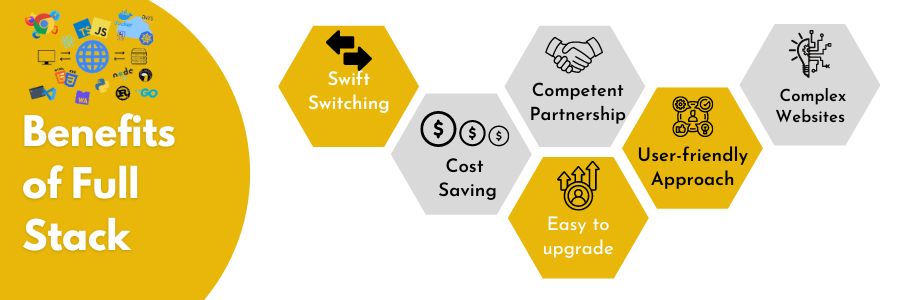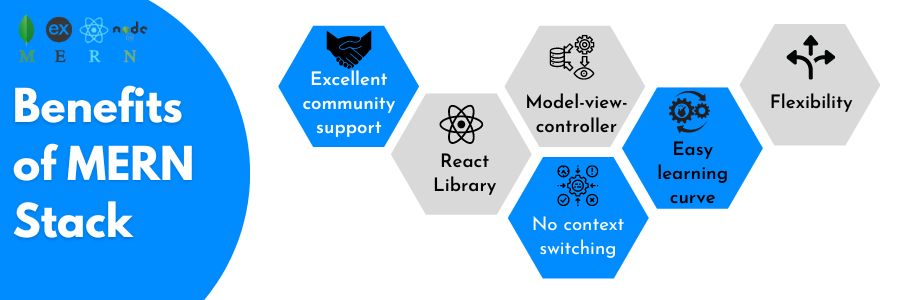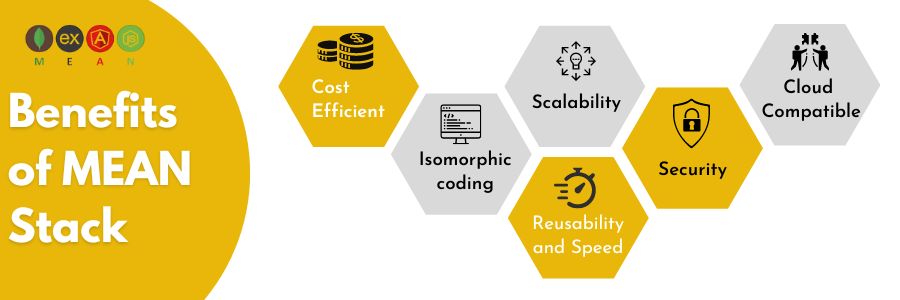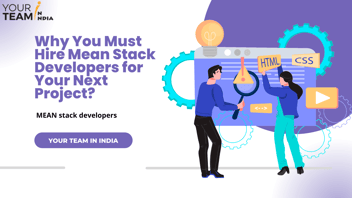Quick Summary:
In the rapidly advancing world of web development, business owners are faced with the crucial decision of selecting the most suitable tech stack for their projects in 2023. This article delves into the comparison between three popular choices: Full Stack, MEAN, and MERN. By understanding the unique features and benefits of each stack, business owners can make informed choices that align with their goals, ensuring optimal success and growth.
Have you recently found yourself comparing technology stacks to choose the best option for your project? To develop an app, you must decide between the MEAN stack vs. MERN stack vs. Full Stack development. Eventually, your decision dictates everything from who you need to hire, how long your app takes to build, and what it costs to build an app using a particular technology.
So what are the critical differences between MEAN Stack vs. Full Stack vs. MERN stack? Which one should you choose for your business?
The critical difference between Full Stack Vs MEAN Stack Vs MERN stack lies in the technology components used. MEAN stack consists of MongoDB, Express.js, AngularJS, and Node.js; Full Stack refers to proficiency in both front-end and back-end development; MERN stack comprises MongoDB, Express.js, React, and Node.js.
Let's have a quick overview of what each of these entails and what they do for app development. But before that, let's understand the concept of a stack.
Key Takeaways
- MEAN stack (MongoDB, Express.js, AngularJS, Node.js) offers businesses the benefit of a comprehensive and integrated stack, providing a unified development environment for building robust and scalable applications.
- MERN stack (MongoDB, Express.js, React, Node.js) empowers businesses with the advantage of using React, a powerful front-end library known for its flexibility, performance, and efficient rendering, resulting in highly interactive and responsive user interfaces.
- Full Stack development, which encompasses proficiency in both front-end and back-end technologies, allows businesses to have a versatile team capable of handling end-to-end development, enabling quicker iterations and faster time-to-market for their products.
- The choice of tech stack for a business should be based on factors such as the project's complexity, scalability requirements, desired user experience, development team's expertise, and long-term maintenance considerations, ensuring the best fit for the specific business needs.
Concept of The Stack - An Overview
A "stack" is a combination of programming languages and technologies. There are two types of stacks, i.e., application and technology.
In simple terms, one can define technology stacks as a cross-disciplinary approach to a software development process.
But before deciding on the technology stack, you need to understand their feasibility and the features which make them suitable for your business.
What is Full Stack, and why choose it?
Full-stack developers are engineers with skills in the various streams of the web development domain, i.e., Frontend, Backend, Mobile app, and Testing.
Back in time, developers focused on one or more of these technologies, but nowadays, the evolving out-of-the-box innovations have increased the demand in the industry for developers with expertise in Frontend and backend. This has created a demand for a full-stack developer.
Full-stack development considers Front-end development technologies such as JS, CSS, and SPA. It considered backend development technologies such as PHP, Node.js, Python, and GO; Databases like MySQL, SQLite, etc.; and even some factors of mobile app development using Android and iOS.
These days, developers play a critical role in eliminating glitches across several streams of software development. As a result, enterprises are now dedicatedly trying to hire full-stack developers who can build the entire web or app from scratch without hassle.
Recommended Read: How to hire full stack developers
Benefits of Full Stack

Still confused about whom to hire! Check the advantages of Full Stack Development below:
1. Swift Switching: With a full stack, easy Switching between the front and back-end development is possible based on the project's requirement.
2. Cost Saving: hiring a specialized full-stack developer rather than front and back end can save you additional expenses, time, and resources.
3. Competent Partnership: Productive partnering is one of the significant reasons to hire an expert proficient in full-stack development. Full-stack developers can create a complete product from scratch and develop innovative solutions whenever possible.
4. Easy to upgrade: It is easy to upgrade with new technology and tools faster than someone specializing only in frontend or backend technology.
5. User-friendly Approach: While a full-stack web application, developers can ensure user-friendly and attractive designs that match UI/UX standards. Also, hiring full-stack developers guarantees the product's uniqueness, accessibility, and innovative function implementation.
6. A preferred option for Complex Websites: Choosing full-stack is one of the best options for all sizes of businesses, but typically for small & medium enterprises as the complex website requirement can be segregated into segments to save time.
Also Read: 12 Reasons Hiring Full Stack Developers is a Competitive Advantage for Businesses
What is the major difference between MEAN Stack and MERN Stack?
The major difference between MEAN and MERN stack for businesses lies in the front-end development framework. MEAN stack utilizes AngularJS, which offers robust features for building complex and scalable applications. MERN stack, on the other hand, employs React, known for its flexibility and efficient rendering, making it suitable for businesses seeking high-performance and interactive user interfaces.
What is MEAN Stack, and why choose it?
The MEAN stack is one of the popular stacks, which is a cluster of JS-based technologies typically used for Web app and website development. Simply put, the MEAN Stack is a full-stack JS framework that enables MEAN stack developers to accelerate website and application development.
Angular, Express.JS, MongoDB, and Node.JS are a set of technologies that make a MEAN Stack technology combination in Mobile and Web Applications. Recently, some complex web apps and websites have been built using MEAN Stack.
MEAN stack developers take advantage of the plethora of compatible tools and plugins to optimize time for system administration purposes. It also ensures fast deployment of web apps, websites, and APIs and solves complex development challenges.
Overall, the MEAN stack has achieved wide acceptance across the industry with many developers, with MEAN stack developers in very high demand and mean stack development services being offered by several companies in the industry.
Also Read: Why You Must Hire Mean Stack Developers for Your Next Project?
Components of MEAN Stack
The MEAN Stack is an acronym for the following components:
- MongoDB is a document-based NoSQL database for backend applications storing data as JSON files.
- Express.js: The backend and web application performed using Node.js
- Angular: Front-end web framework to make run JS code in the end-user's browser.
- Node.js: JS runtime environment to implement and execute the application backend in JS.
Benefits of MEAN Stack

Unsure how MEAN stack can benefit your business? Check the advantages of MEAN Stack Development below:
1. Cost Efficient: MEAN stack technology is cost-efficient for startups and small businesses. Being open-source and JavaScript based, it reduces development costs and ongoing maintenance.
2. Isomorphic coding: With MEAN stack, isomorphic coding is possible, so you can quickly transfer code written in one framework to another. It allows easier data flow through the components on both the server and client sides as it uses a common language for both.
3. Scalability: MongoDB features such as high availability and auto-sharing make the MEAN stack extremely useful in scaling up the application as your traffic grows with time. MEAN Stack helps you quickly scale all the frontend and backend layers along with the database.
4. Reusability and Speed: Since Angular is an open-source JavaScript framework, the MEAN stack provides developers with a high level of reusability, excellent development speed, testability, and maintenance.
5. Security: Ensuring your application is secure from cyberattacks is one of the top priorities for businesses. According to the 2020 McAfee mobile threat report, half of the mobile threats in 2019 came from malicious apps. MEAN Stack provides developers with all the necessary security tools to keep their apps secure from malicious threats.
6. Cloud Compatible: MEAN stack also increases Speed and reduces circle space cost due to its cloud compatibility. MongoDB transfers cloud functions within the app, keeping your app lightweight, swift, and easily accessible.
What is MERN Stack, and Why Choose It?
Apart from the Full Stack and MEAN technology stacks, the MERN stack has recently gained popularity. The MERN stack is commonly used to design top-of-the-line web applications. The MERN stack is a JS-based stack that enables the smooth workflow of web development processes.
MERN stack developers provide a comprehensive framework to app developers looking for complete JavaScript frameworks, databases, and runtime environments. It also includes open-source components, plugins, libraries, and more, making the Stack efficiently compatible with current technology.
Recommended Read: Angular vs React vs Vue
Components of MERN Stack
The MERN stack consists of 4 technologies that make up its name:
- MongoDB: Employed as a document-based NoSQL database.
- Express: It's a web framework for Node.js technology
- React: It's an open-source javascript frontend library for UI development.
- Node.js: It is a JavaScript runtime created on Chrome's V8 JavaScript engine employed for allowing JS to run server-side.
The major difference between MEAN and MERN Stack is that MEAN Stack uses Angular, and MERN Stack uses React.js for frontend web development.
Benefits of MERN Stack for App Development

Still confused about deciding on whether to choose the MERN stack or not? Check the advantages of MERN Stack Development below:
1. Excellent community support: MERN stack is supported by a highly engaged community. This makes it easy for new developers.
2. React Library: MERN stack has an inbuilt React library that enables developers to access high-end tools for making the development process easier and seamless.
3. Model-view-controller: MERN stack's MVC architecture ensures a seamless development process, freeing developers to focus on improving app functionalities.
4. No context switching: MERN Stack uses only JavaScript for frontend and backend development. Therefore, app developers do not need to be concerned about context switching, which eventually ensures efficient app development.
5. Easy learning curve: Developers possessing skills and knowledge in JavaScript and JSON can quickly get on board with the MERN stack without much hassle or training. The easy learning curve decreases training time and provides businesses access to a wider pool of developers, ultimately leading to a high-quality app.
6. Flexibility: The MERN stack is an open-source platform that offers flexibility to choose development tools, frameworks, and components from wider options.
Building and customizing applications with a high-quality, high-performance product is easier with the JS stack. It allows developers to build pages on the server as and when required.
For most projects, though, choosing between the MEAN stack and MERN stack depends on more than the season's flavour. So let's take a look at the key differences between the two.
Tabular comparison between MEAN stack and MERN stack
| Features | MEAN | MERN |
| Type | JavaScript Framework | JavaScript Library |
| Language | TypeScript | JavaScript, JSX |
| DOM | Regular | Virtual |
| Architecture | Component-Based | Component-Based |
| Data Flow | Bidirectional | Unidirectional |
| Learning Curve | Medium | Low |
| Features | Moderate | High |
| Security | High | Medium |
| Scalability | Medium | High |
How to Know Which Stack to Choose
With the advancement of Agile development methods, choosing the right technological infrastructure to add value to your business growth and maximize its ROI has become increasingly important. Before selecting a stack for your business, you need to consider the following:
- The specific project requirements
- Incorporating agility
- The need to outperform project anticipations for the audience.
- Scalability and flexibility of the dev team
- Total dev cost that can be borne
What Stack Are You Planning to Choose?
Choosing the right stack will improve your software development efforts. The technology advancements and groundbreaking innovations in the software market make it a daunting task to select one of these tech stacks.
If you plan to develop a larger project, MEAN is the way to go. MERN will help you create small-scale web apps. Full-stack is the best option for you if you want to develop complex functionality, depending on your budget and project requirements.
If you are still unsure about which stack to choose for your project, consult dedicated and experienced full-stack developers to get the best-in-class web development services. At YTII, you can easily onboard full-stack developers that can work on the complete development cycle without any limitations.
If you are looking for a free consultation on your product development, share your requirements, or contact us at info@yourteaminindia.com, and our team will get in touch with you shortly.
Frequently Asked Questions [FAQs]
What is the major difference between MEAN Stack and MERN Stack?
When to Choose MERN Stack For Your Project?
Which is better, MEAN Stack or MERN Stack?
Is MERN stack in demand?
Is MERN stack the future?
Which is the best JavaScript stack?
How do you pick a tech stack?





![How To Build CMS Using NodeJS Tech Stack [Complete Guide]](https://www.yourteaminindia.com/hs-fs/hubfs/Imported_Blog_Media/Building-Content-Management-System-Using-NodeJS-Tech-Stack-Sep-25-2023-10-23-32-1722-AM.png?width=352&name=Building-Content-Management-System-Using-NodeJS-Tech-Stack-Sep-25-2023-10-23-32-1722-AM.png)

